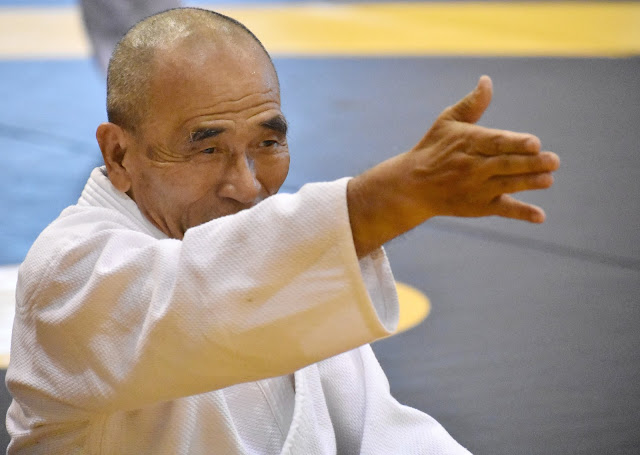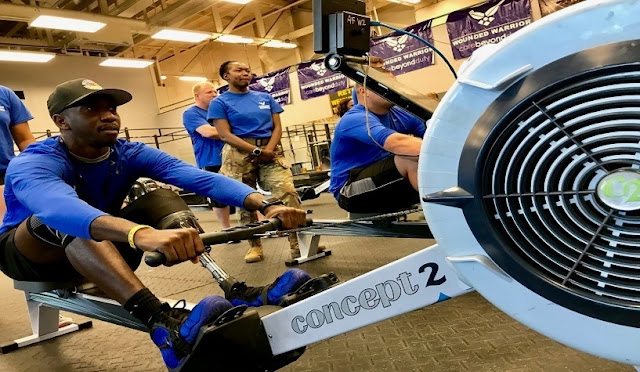Camp Zama aikido sensei offers harmony, balance through martial arts class

Story by Winifred Brown
US Army Garrison - Japan
CAMP ZAMA, Japan – Yotaro Mukai has taught aikido at the Yano Fitness Center here for 21 years, and he welcomes everyone. For those who want to learn, Mukai offers classes at convenient times for anyone who has access to the gym. He offers free classes every day during the work week during lunch; two more classes in the evening on Tuesday and Thursday; and another class from 10 a.m. to noon on Saturday. Mukai, a retired colonel from the Japan Ground Self-Defense Force, began studying aikido 56 years ago when he was a cadet at the National Defense Academy, the Japanese equivalent to the U.S. Military Academy at West Point, New York. He holds the second-highest rank in aikido, the rank of seventh “dan,” or “shichidan.” He is a “shihan,” or master instructor, and volunteers his services. At this point, Mukai said he doesn’t feel like he is teaching, but rather practicing and learning new things every day. According to the International Aikido Federation, Morihei Ueshiba, a martial arts expert, created aikido in the 1920s and people now practice it in 140 countries. The martial art blends the motion of attackers and redirects the force of attacks rather than opposing them head on. The goal of practicing is to improve one’s character according to the rules of nature. Mukai said that while people should keep in mind that aikido is painful, difficult and can lead to injuries, it has a lot of benefits. To start, because there are no competitions in aikido, one’s mind is always peaceful, Mukai said. Aikido is all about harmony, Mukai said, not about beating the other person, but getting better together. In addition, the whole point of aikido is to convince one’s opponent not to fight, so any potential fight begins with a mind game designed to avoid a fight, Mukai said. Although many Americans think aikido is all about strength or power, that is not the case, Mukai said, and anyone of any size or age can successfully practice the martial art. Another benefit is that unlike in some other sports, such as baseball, where athletes might peak in their 20s, there is no age peak in aikido, Mukai said. Since the competition in aikido is always against oneself to improve, those who study aikido will always get better, Mukai said. It is also a good way to improve balance, Mukai said, since aikido moves require people to use both the left and right sides of their body. Mukai said he recently realized he has learned the most about aikido by teaching beginners and people who aren’t good at it, particularly when it comes to avoiding injury and improving. He tells students to come to class when they can, Mukai said, and there is no need to tell him if they can’t make it to a particular class. The classes meet on a large wrestling mat inside the gymnasium, and newcomers do not need to initially wear a “gi,” the traditional uniform for practicing martial arts, although they should wear pants that go past their knees to avoid rub burns from the mat. Mukai has a strong following of students, and Luke Huynh, an engineer at the U.S. Army Corps of Engineers, Japan Engineer District, said he began studying aikido with Mukai three years ago. Huynh, who often goes to Mukai’s lunchtime classes, said he enjoys aikido because it is a healthy sport and a good break from work. “It’s lunchtime—you work, you’re stressed out, you want 45 minutes totally focused on aikido,” Huynh said. “When you get back, you’re fresh and we’re ready to work again.” He also likes the fact that aikido is not about attacking, but about self-defense and using opponents’ strength against them, Huynh said. The martial art also places an emphasis on improving the personalities of the people who practice it, Huynh said. “It’s not about strength, it’s not about moving; it’s about working together, so when we step on the mat, we are basically the same—no rank, nothing, except for the sensei, and you listen to the sensei for teaching,” Huynh said. Geoff Ward, an architect at JED who also attends the lunch classes frequently, said aikido has been a new experience that gives him a break during the workday. In addition to the exercise, Ward said he also has found that the classes offer him a cultural experience that helps him learn more about Japan. Ward said he expects to continue with the classes while he is at Camp Zama. “It’s been a lot of fun, and I really enjoy it,” Ward said. “It’s been good to meet some of the other folks who do it.” Stefan Thompson, chief of fitness, athletics and aquatics for Camp Zama Family and Morale, Welfare and Recreation, said Mukai’s classes are a great addition to the fitness offerings at Camp Zama and he is honored to host him at the gym. “Sensei Mukai selflessly volunteers his time to all comers six, sometimes seven days a week, teaching the art of aikido,” Thompson said. “Not only do you get masterful technique instruction, but also an integration of Japanese culture through his teaching.”



Comments
Post a Comment